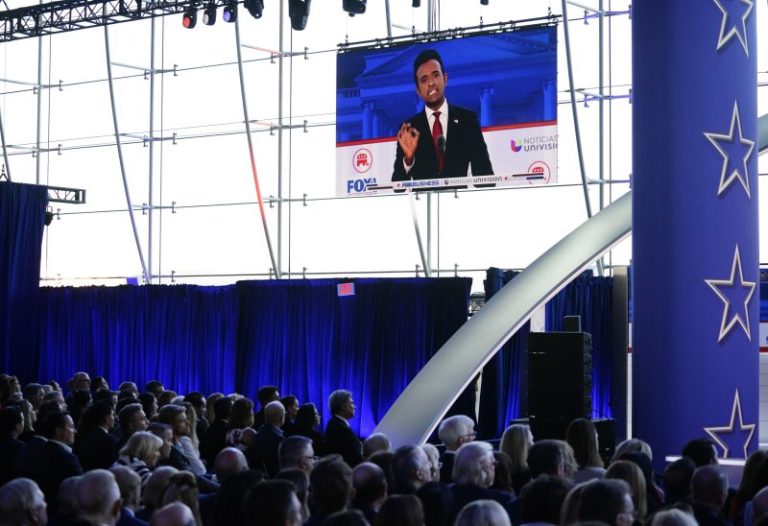Republican presidential hopeful Vivek Ramaswamy resurrected a 2015 proposal from then-candidate Donald Trump at Wednesday’s debate: ending birthright citizenship.
He was asked by Univision host Ilia Calderón “what legal premise” he would use to expel undocumented immigrants and their American-born children from the country. Ramaswamy began by noting that his opponents onstage “are on the right side of this issue” by supporting the militarization of the southern border, defunding “sanctuary cities,” and an end to foreign aid to Mexico and Central America, but the candidate said he would go a “step further” by ending “birthright citizenship for the kids of illegal immigrants in this country.”
2024 presidential election
End of carousel
Ramaswamy, the son of Indian immigrants, broke into an anti-immigrant argument by saying that the 14th Amendment — which guarantees birthright citizenship to most people born in the United States — says “all persons born or naturalized in the United States and subject to the laws and jurisdiction thereof, are citizens.”
Because of this, he argued, children of undocumented immigrants born in the United States should not be granted citizenship, because their parents “broke the law” to be in the country.
“As the father of two sons, it is hard for me to look them in the eye and say, ‘You have to follow the law,’ when our own government fails to follow its own laws,” Ramaswamy said.
Birthright citizenship is a common target of Republican candidates on the campaign trail. In 2015, Trump proposed that Congress should end birthright citizenship for children born to undocumented immigrants in the United States.
And, in 2018, Trump said he planned to issue an executive order that would end the automatic grant of citizenship to those born in this country to noncitizens. That order never came to fruition.
As The Washington Post reported then, while legal experts have debated for years how to interpret the citizenship clause of the Constitution’s 14th Amendment, the consensus is one-sided: Most agree with the long-held tradition that it grants citizenship to those born on U.S. soil.
The first section of the amendment says: “All persons born or naturalized in the United States, and subject to the jurisdiction thereof, are citizens of the United States and of the State wherein they reside.”
Some legal scholars argue that the phrase “and subject to the jurisdiction thereof” seems to give the government some leeway to restrict the right, just as other constitutional principles can be limited.
But the mainstream opinion from both the right and the left is that it is more likely that a constitutional amendment, rather than federal legislation or an executive order, would be needed to change the birthright conferred on people born here.
Sen. Tim Scott (R-S.C.), however, appeared to agree with Ramaswamy on the debate stage Wednesday by arguing that the current interpretation of the 14th Amendment is wrong.
“I think it’s simple that clearly it was designed for slavery, and not for illegal immigration,” he said.
Scott, however, did not delve deeper into this argument and instead pivoted to attacking Ramaswamy’s business relationship with China.
Throughout the second Republican presidential debate, which was held Wednesday night at the Ronald Reagan Presidential Library in Simi Valley, Calif., candidates pivoted to immigration and the situation at the southern border when answering questions on other topics. When asked about President Biden’s visit to the picket line in Detroit, Scott said the president “should not be on the picket line; he should be on the southern border working to close our southern border.”
Former vice president Mike Pence, meanwhile, was asked several times if he would work with Congress to secure a legal pathway to citizenship for foreign-born people who were brought to the United States illegally as children or who overstayed their visas as children — people known as “dreamers” — and who are allowed to live and work in the country under the Deferred Action for Childhood Arrivals (DACA) program, which the Trump administration sought to end.
But instead of saying whether he would fully end the program or find a legal pathway to citizenship for DACA recipients, Pence pivoted instead to talk about the Trump administration’s immigration policies and how he would replicate them as president.
“The truth is, we need to fix a broken immigration system, and I’ll do that,” Pence said. “But first and foremost, a nation without borders is not a nation. And we have to secure the southern border of the United States of America. I know how to do it, and we will do it again.”
Other candidates attempted to blame the nation’s crime statistics on immigrants.
“The second we stopped being a country of laws, we give up everything this country was founded on, so we have to secure the border,” former U.N. ambassador Nikki Haley said. She said, without presenting evidence, that crime in Philadelphia is caused by the city’s sanctuary policies. “You see what’s happening in Philadelphia right now. It’s got to stop.”
Former New Jersey governor Chris Christie, meanwhile, claimed that Democrats are not “enforcing that law” at the border. He vowed that, on the first day of his presidency, he would “sign an executive order to send the National Guard to partner with Customs and Border Patrol to make sure that we stop the flow of fentanyl over the border.”
Robert Barnes contributed to this report.

